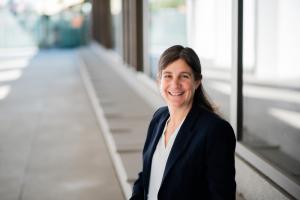
Description
Melissa Stockwell, M.D., M.P.H., wears a lot of different hats. She’s a doctor, researcher, educator, and chief of the division of child and adolescent health at Columbia University’s Vagelos College of Physicians and Surgeons in New York. And lately, she’s become a key leader in the four-year NIH-led effort to learn about the long-term effects of COVID. As chair of the Pediatric Study Design Committee of the Researching COVID to Enhance Recovery Initiative (RECOVER), Stockwell’s focus is singular and urgent: to learn how the still poorly-understood syndrome known as Long COVID affects children and teens.
“There was a time when people had the misconception that children didn’t get Long COVID,” Stockwell said. “Now we believe that it may manifest in some ways the same, but in some ways differently than adults. That’s part of what we hope to learn: What does Long COVID look like in children? What is the prevalence? How is it different from adults with the condition?”
In many ways, Stockwell, with her unquenchable curiosity, was made for the job. But her pathway has never been a straight one. In college, she majored in Latin American studies. In her junior year while studying abroad in Chile, she worked with a health program in an underserved community in Santiago and discovered a love for public health. When she went to medical school, she developed a strong interest in pediatrics, later combining her two passions — public health and pediatrics — into a research career focused on improving the health of medically underserved children.
Along the way, Stockwell, who also has a joint appointment at Columbia University’s Mailman School of Public Health, helped pioneer the use of digital technologies, specifically text messaging, to impact the use of vaccines in children to prevent diseases such as influenza. She calls getting kids vaccinated “one of the most important things you can do for pediatric health and public health.” Her research also explored using technology to gather data about respiratory infections and vaccine adverse events. During the pandemic, those interests led to her participation in the RECOVER program.
“Physicians may not be thinking about Long COVID in kids, but it’s important that they do,” said Stockwell, who is also a practicing pediatrician at NewYork-Presbyterian Hospital. Prolonged fatigue, mood changes, headaches, respiratory symptoms, and intolerance to standing and to exercise have been flagged as just some of the potential signs of the condition in this group. “But we’re still getting a handle on the symptoms.”



